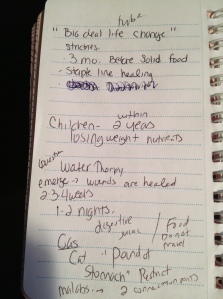Jotting Scans
Transcriptions
Very early on in the semester, I spoke with a 44-year old woman who underwent Bariatric surgery in June of 2009. I decided not to take down her name for privacy reasons, but in my notes and in this transcription I refer to her as “S.C.” The woman is a co-worker with a member of my family and was happy to discuss some of the issues she went through after her surgery. Because of her hectic work schedule (she is a nurse), she agreed to meet me during her lunch break. S.C. asked me to wait while she finished checking on her patients and asked me to meet her in the break room. I sat alone at a round, off-colored table, staring at four empty cushion-filled light pink seats. This being my first field note experience in relation to my topic, I felt a bit nervous and uneasy. When I was invited to the hospital and entered the unit S.C. works on, I received nothing but positive vibes from everyone. People were interested in learning about the topic I was covering. The other nurses wanted to know what school I was from, what I was studying and what my class was about. S.C. arrived in the break room in good spirits, flashing her perfectly straight teeth. She wore a light pink nurse’s scrub outfit and bright white sneakers. She was adjusting her I.D. badge attached to her shirt while she told me the timeline of her adjustable band surgery. S.C. told me she brought a chicken salad, but wasn’t hungry.



